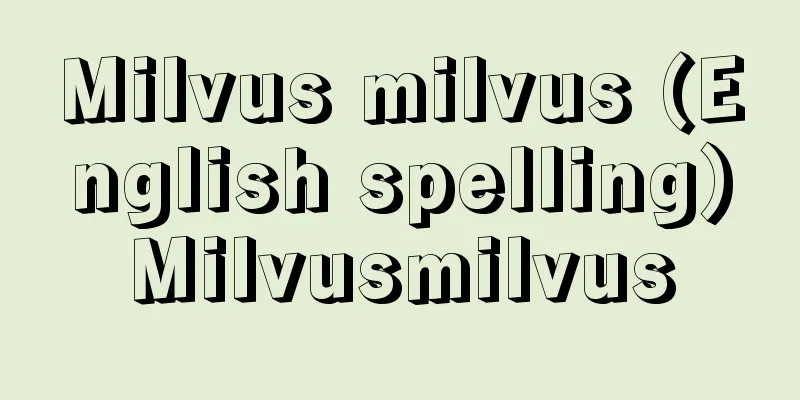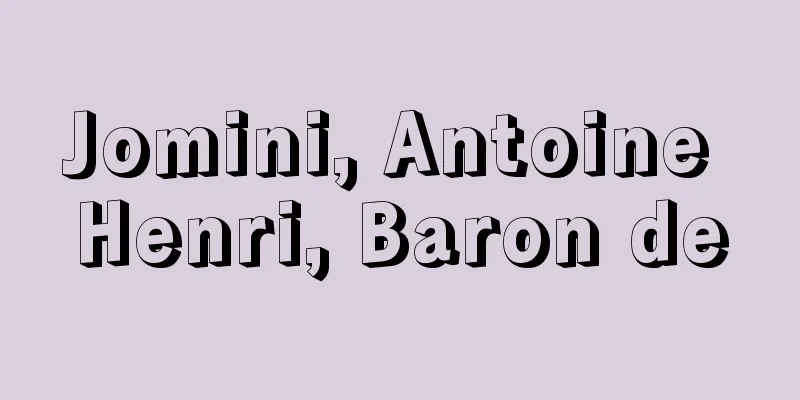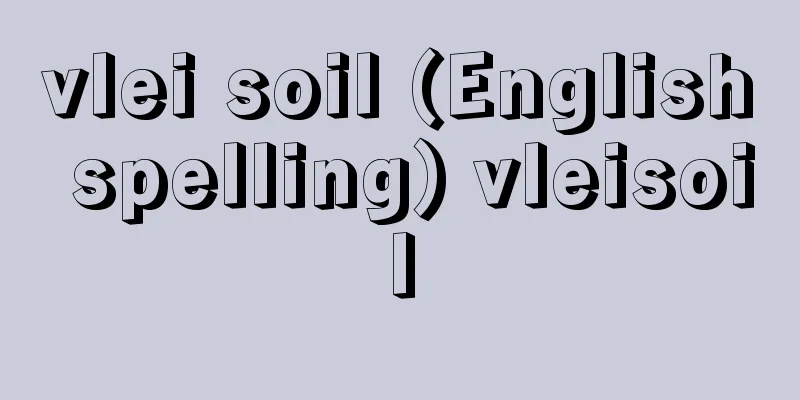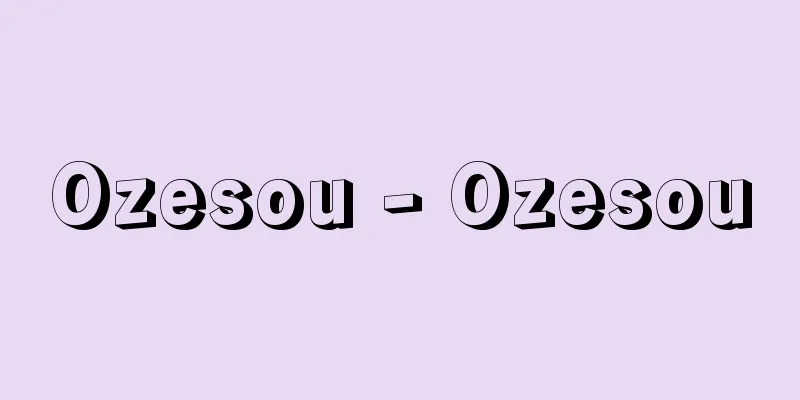Instinct - Instinct (English), Trieb (German)
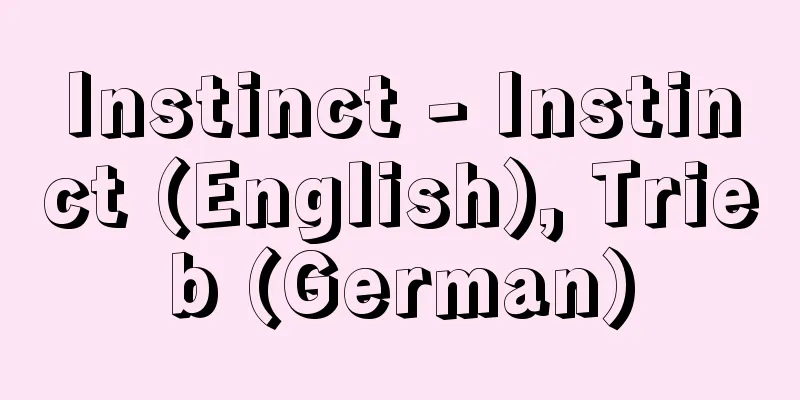
|
Instinct is an innate mechanism or impulse inherent in living organisms that causes behavior. This word has been used in everyday language for a long time, and at the same time, it has been used as a technical term by various researchers in psychology and related fields. As a result, its definition and scope are diverse. [Instinct in evolution] Darwin, C., wrote in On the Origin of Species by Means of Natural Selection (1859) that "Actions which in humans require experience, but which animals (especially young ones) perform without experience, and which many perform without knowing the purpose of the action, are usually called instinctive," but continued, "But these characteristics are not universal." From the standpoint of evolution, he argued that the instincts seen in wild animals are based on natural selection, while the instincts of domestic animals are the result of artificial selection. [Instinct in American psychology from the late 19th century to the early 20th century] James, W. (1890) defined instinct as the ability to act to achieve a specific purpose without foreseeing the outcome or prior training. He considered instinct to be a blind act caused by impulse, which can change into purposeful behavior as a result, and included behaviors involving experience in the category of instinct. The list of human instinctive behaviors he listed is extremely diverse, ranging from simple movements seen in newborns, such as sucking and grasping, to emotions such as shame and jealousy. McDougall, W. (1908) inherited this theory of instinct. He argued that instinct is an innate psycho-physical disposition with three aspects: paying attention to a certain object (cognition), experiencing a certain emotional excitement (emotion), and attempting to engage in a certain action (will). The main instincts he listed were flight, rejection, curiosity, fight, self-deprecation, self-esteem, parental behavior, reproduction, gregariousness, acquisition, and creation. For example, the instinct to fight is accompanied by emotions such as fear, and the instinct to reject is accompanied by disgust. McDougall extended the concept of instinct to the process of personality formation and social systems, and spoke out actively in many areas. For example, he argued that social reform should be carried out to restore conditions close to the original human living conditions and satisfy the needs of instincts in order to solve the mental problems caused by mechanized and industrialized society. Dunlap, K. criticized such instinct theories in an essay titled "Do Instincts Exist?" (1919). He acknowledged the existence of instinctive behavior and the value of classifying them, but argued that we should stop talking about instincts as a concept to explain behavior. [Instinct in Psychoanalysis] Freud, the founder of psychoanalysis, positioned instinct (Trieb) as an important concept in the interaction of the mind (psychodynamics), but his theories have differed over time. In his early theory (1905), he hypothesized that the sexual instinct is an impulse that shakes stability, in contrast to the ego instinct that seeks stability in the ego, and this energy was called libido. In his later theory (1920), he described a conflict between the life instinct, or Eros, which contributes to love, reproduction, and production, and the death instinct, or Thanatos, which aims for destruction, decay, and annihilation, and said that each of these is directed toward the ego and the external world. In other words, they are the instincts of self-love, love of others, self-destruction, and destruction of others. [Instinct in learning psychology] Pavlov, IP (1927), a physiologist who established the theory of conditioned reflexes, agreed with the theory of British philosopher Spencer, H., who said that instincts are nothing more than reflexes. In general, instincts are said to be more complex and systematic than reflexes, and are systemic actions that depend on the internal state of the organism, but Pavlov gave counterexamples showing that reflexes that have these characteristics also exist, and pointed out that it is not possible to draw a clear line between actions considered to be instincts and normal reflexes. Furthermore, he said that if instinct and reflex refer to the same object, the more scientifically defined concept of reflex should be used, and that the concept of instinct is unnecessary. Watson, JB, devoted two chapters of his representative work, Behaviorism (1930), to a discussion entitled "Whether Man Has Instincts." He divided human behavior into unlearned behavior and learned behavior, and claimed that what psychologists and biologists call instincts was not included in the former list. He therefore declared that "instincts do not exist, and are not necessary as a psychological term," and that so-called instinctive behavior is learned behavior, that is, the result of training. He strongly criticized James' list of instincts, and also pointed out, through observation of infant behavior, that habit factors are involved even in behaviors that are considered to be innate reflexes. One of the most commonly cited studies showing that experience has a large effect on so-called instinctual behavior is the experiment on cats killing mice conducted by Kuo, ZY (1930). Only about half of the cats raised alone after weaning killed mice, whereas most of the cats who were shown their parents killing mice began to kill mice, and cats raised with mice almost never killed mice. Learning psychologists who take a behaviorist stance tend to emphasize the role of experience so much that they even refuse to call behavior instinctive. However, Skinner, B.F. (1974) acknowledges that innate behaviors that are more complex and flexible than reflexes can be called instinctive, and simply denies the use of instinct as a concept to explain behavior (for example, the tautological explanation that birds build nests because they have a nesting instinct). This is close to the position of Dunlap mentioned above. Skinner's assistants, Breland, K., & Breland, M. (1961), started a business performing animal tricks, but often faced difficulties while training the animals. For example, a pig that had been trained to hold a coin in its mouth and put it in a piggy bank would eventually drop the coin on the ground, rub it with its nose, and bounce it up, a useless behavior that was repeated over and over again. They believed that this was the result of learned behavior drifting in the direction of the instinctive behavior of digging up food with the tip of the nose, and called this phenomenon instinctive drift. This is a type of explanation for instinctive behavior that Skinner rejected, but it does not constitute tautology as he pointed out. The Brelands' discovery pointed out the influence of instinct on learned behavior, that is, the biological constraints of learning, and differed from the perspective of previous researchers (for example, Watson and Guo Renyuan) who pointed out the influence of learning experience on instinctive behavior. [Instinct in ethology] Heinroth, O. (1910) described the instinctive behavior of animals as species-specific impulsive behavior (arteigene Triebhandlung) and promoted its research. Craig, W. (1918) divided instinctive behavior into appetitive behavior and consummatory act, and said that the former changes depending on experience and the local environment, while the latter is a fixed behavior that is genetically determined and specific to the species. Lorenz, K. Z. (1932) defined instinctive behavior as a genetically determined fixed motor pattern called inherited coordination, and said that instinctive behavior is different from reflexes in that it is accompanied by a pleasant emotion, and that this pleasant emotion is the purpose of instinctive behavior. According to his student, Tinbergen, N. (1951), instinct is a hierarchical mechanism of various activities that are released in a chain according to internal factors and external stimuli. He classified instinctive behavior into fixed patterns that are controlled by internal motivation factors once released by external stimuli, and taxis, which are a series of actions that proceed while adjusting the direction of movement and the form of reaction according to external stimuli. Lorenz and Tinbergen said that instinctive behavior is an adaptive pattern acquired by evolution that is expressed with maturation, but learned behavior is transformed by the individual's unique experience. Therefore, pure instinctive behavior can be discovered by isolation experiments that do not provide opportunities for learning. For example, Tinbergen (1942) reported that sticklebacks reared in isolation showed aggressive behavior toward a red model of their abdomen, just as sticklebacks reared in normal conditions showed. However, Lehrman, DS (1953) argued that what is important is not "whether they are isolated" but "what they are isolated from," and pointed out that in this case, the sticklebacks had seen their own reflections in glass or on the surface of the water. He then criticized the instinct theory of Lorenz and Tinbergen, which contrasts maturation with learning, for neglecting the complex interactions between heredity and experience in behavioral development. [Instincts in evolutionary psychology] Tooby, J. and Cosmides, L. (1992), leading researchers in evolutionary psychology who consider the human mind and behavior from the perspective of evolutionary biology, argue that humans have evolved to have multiple instincts to flexibly solve problems. These are adaptive mental modules brought about by natural selection, and many modules are hypothesized, including face recognition, spatial relations, tool use, fear, emotional perception, child rearing, and friendship. In addition, Pinker, S., in his books for the general public, such as The Language Instinct (1994) and The Blank Slate (2002), argues for the innateness of cognitive abilities, including language ability, and develops a critique of empiricism. [Sadahiko Nakajima] Latest Sources Psychology Encyclopedia Latest Psychology Encyclopedia About Information |
|
生活体に内在し,行動を引き起こす生得的なメカニズムあるいは衝動を本能という。このことばは古くから使われている日常語であると同時に,心理学およびその関連領域で,さまざまな研究者が専門用語として使用してきた。このため,その定義とそれが指し示す範囲は,多様なものとなっている。 【進化論における本能】 ダーウィンDarwin,C.は『種の起原On the Origin of Species by Means of Natural Selection』(1859)において,「われわれ人間であれば経験を必要とする行為だが,動物(とくに幼い個体)が経験なしに行ない,その行為の目的を知ることなしに多くの個体が行なうものは,通常,本能的といわれる」と述べているが,それに続けて「しかし,これらの特徴は普遍的なものではない」と記している。また,進化論の立場から,野生動物に見られる本能は自然選択に基づくもので,家畜の本能は人為選択が加わったものだと論じた。 【19世紀末~20世紀初期アメリカ心理学における本能】 ジェームズJames,W.(1890)は,本能とは,結果についての見通しをもたず,事前訓練もなしに,特定の目的を達するように行動する能力であるとした。彼は,本能を衝動impulseによって引き起こされる盲目的な行為であるが,その結果により目的的行動へ変化するとして,そうした経験の関与した行動も本能に含めた。彼が挙げた人間の本能行動のリストは,吸啜や把握のように新生児に見られる単純な運動から,羞恥や嫉妬のような感情まできわめて多岐にわたっている。 こうした本能論を受け継いだのが,マクドゥーガルMcDougall,W.(1908)である。彼は,本能とは生得的な精神物理的傾向性innate psycho-physical dispositionであり,特定の対象に注意を向け(認知),特定の情緒的興奮を経験し(感情),特定の行為に従事しようと試みる(意志),という三つの側面をもつと論じた。彼が挙げた主要な本能は,逃走,拒否,好奇,闘争,自己卑下,自尊,親的行動,生殖,群居,獲得,制作であり,たとえば,闘争本能には恐怖,拒否本能には嫌悪といった感情が付随する。マクドゥーガルは,本能概念を人格形成過程や社会制度にまで拡張し,多方面にわたって積極的に発言した。たとえば,社会改造によって人間本来の生活条件に近い状態を取り戻し,本能の充足を満たすことが,機械化・工業化された社会が引き起こしている精神的問題の解決のために必要であると訴えた。そのような本能論を「本能は存在するか?」と題した論文(1919)で指弾したのがダンラップDunlap,K.であった。彼は,本能的な行動は存在するし,それを分類することの意義は認めるが,行動の説明概念として本能を語ることはやめるべきだと主張した。 【精神分析学における本能】 精神分析学の創始者であるフロイトFreud,S.は,本能(衝動Trieb)を心の相互作用(精神力動psychodynamics)の重要概念として位置づけたが,その理論は,時期によって異なっている。初期の理論(1905)では,自我の安定を求める自我本能ego instinctに対し,安定を揺るがす衝動として性本能sexual instinctが仮定されており,そのエネルギーがリビドーlibidoとよばれた。後期の理論(1920)では,愛・生殖・生産に寄与する生の本能すなわちエロスErosと,破壊・衰退・死滅をめざす死の本能すなわちタナトスThanatosの相克が描かれ,そのそれぞれが自我と外界対象に向けられるとした。すなわち,自己愛,他者愛,自己破壊,他者破壊の本能である。 【学習心理学における本能】 条件反射学を打ち立てた生理学者パブロフPavlov,I.P.(1927)は,本能は反射reflexにすぎないとしたイギリスの哲学者スペンサーSpencer,H.の説に同意を示している。一般に,本能は反射よりも複雑かつ系列的で,生体の内部状態に依存する全身的な行動であるとされるが,パブロフはこれらの特徴を有する反射も存在すると反例を挙げ,本能とされている行動と普通の反射との間に明確な一線を引くことはできないと喝破した。さらに,本能と反射が同一の対象を意味するなら,より科学的に定義されている反射概念を用いるべきであると述べ,本能概念は不要だとした。 ワトソンWatson,J.B.は,その代表的著作『行動主義Behaviorism』(1930)の二つの章を「人間に本能があるか」と題した論考に充てている。彼は,人間の行動を,学習によらない行動unlearned behaviorと学習された行動learned behaviorに区分し,心理学者や生物学者が本能とよんでいるものは,前者のリストには含まれていないと主張した。したがって,「本能などなく,心理学用語として必要ではない」と断じ,いわゆる本能行動は学習された行動,つまり訓練の結果だと明言した。彼はジェームズが挙げた本能のリストを強く批判し,また乳幼児の行動を観察して,生得的な反射だとされている行動にも習慣の要因が関与していることを指摘した。 いわゆる本能行動に経験が大きく影響することを示した研究としてよく言及されるものに,郭任遠Kuo,Z.Y.(1930)が行なったネコのネズミ殺しの実験がある。離乳後単独飼育したネコは約半数しかネズミを殺さなかったのに対し,親ネコのネズミ殺しを見せたネコはほとんどがネズミを殺すようになり,ネズミと一緒に育ったネコはほとんどネズミ殺しをしなかった。 行動主義の立場に立つ学習心理学者は経験の役割を強調するあまり,行動を本能的とよぶことすら拒否する傾向にある。しかし,スキナーSkinner,B.F.(1974)は生得的行動のうち反射よりも複雑で柔軟なものを本能的行動とよぶことは認めており,行動の説明概念として本能を用いること(たとえば,鳥には営巣本能があるから巣を作るといった同語反復的説明)を否定しているだけである。これは前述のダンラップの立場に近いといえる。スキナーの助手であったブレランド夫妻Breland,K.,& Breland,M.(1961)は動物芸を披露するビジネスを始めたが,動物を訓練しているときに,しばしば困難に直面した。たとえば,コインをくわえて貯金箱に入れるという芸を仕込んだブタは,やがてコインを地面に落として鼻先で擦りつけ跳ね上げるという無駄な行動を繰り返し行なうようになった。餌を鼻先で掘り出すという本能的行動の方向に,学習された行動が流された結果であると彼らは考え,こうした現象を本能的漂流instinctive driftとよんだ。これは,スキナーが否定した本能による行動の説明の一種であるが,彼が指摘したような同語反復にはなっていない。なお,ブレランド夫妻の発見は,学習行動に及ぼす本能の影響,すなわち学習の生物学的制約biological constraintを指摘したものであって,本能行動に及ぼす学習経験の影響を指摘したそれまでの研究者(たとえば,ワトソンや郭任遠)の視点とは異なっている。 【動物行動学における本能】 ハインロートHeinroth,O.(1910)は,動物の本能行動を,種に特有な衝動行動arteigene Triebhandlungと表現し,その研究を推進した。また,クレイグCraig,W.(1918)は,本能行動を欲求行動appetitive behaviorと完了行為consummatory actに分け,前者は経験やその場の環境に応じて変容するが,後者は遺伝的に規定された種に特有な固定的行動であるとした。 ローレンツLorenz,K.Z.(1932)は,遺伝協応inherited coordinationとよばれる遺伝的に決定された固定的運動パターンを本能行動とし,行動に快感情が付随する点が反射とは異なっており,この快感情こそ本能行動の目的であるとした。彼の弟子であるティンバーゲンTinbergen,N.(1951)によれば,本能とは内的要因と外的刺激に従って連鎖的に解発される諸活動の階層的機構である。彼は本能行動を,外的刺激により一度解発されると内的な動機づけ要因が統制する固定パターンfixed patternと,外的刺激に応じて運動の方向や反応の形を調整しつつ進む一連の行動である走性taxisとに分類した。ローレンツやティンバーゲンは,本能行動は進化によって獲得された適応様式が成熟に伴って発現したものであるが,学習行動はその個体の固有経験によって変容するものだとした。したがって,学習の機会を与えない隔離実験isolation experimentによって純粋な本能行動を見いだすことができることになる。たとえば,ティンバーゲン(1942)は,隔離飼育されたトゲウオは,通常飼育された場合と同じように,腹部の赤い模型に対して攻撃行動を示したことを報告している。しかし,レーマンLehrman,D.S.(1953)は「隔離されているかどうか」ではなく「何から隔離されているか」が重要だと主張し,この例の場合,トゲウオはガラスや水面に映った自らの姿を見た経験があると指摘した。そのうえで,成熟と学習を対置するローレンツやティンバーゲンの本能論は,行動発達における遺伝と経験の複雑な相互作用を軽視していると論難した。 【進化心理学における本能】 進化生物学の観点からヒトの心や行動を考える進化心理学evolutionary psychologyの有力な研究者であるトゥービーTooby,J.とコスミデスCosmides,L.(1992)は,ヒトは問題を柔軟に解決するための複数の本能を進化の過程で有するようになったと論じている。それは,自然選択によってもたらされた適応的な心のモジュールであり,顔認識,空間関係,道具使用,恐怖,情動知覚,育児,友情など多くのモジュールが仮定されている。また,ピンカーPinker,S.は,『言語を生みだす本能The Language Instinct』(1994)や『人間の本性を考えるThe Blank Slate』(2002)などの一般向けの著作で,言語能力をはじめとする認知能力の生得性を論じて経験論批判を展開している。 〔中島 定彦〕 出典 最新 心理学事典最新 心理学事典について 情報 |
Recommend
Meckenem, Israel van
[Born] Around 1450 [Died] 1503 German copperplate ...
John Wiley & Sons, Inc.
…Printed and bound by a bookstore [Minowa Shigeo]...
Gustav V
1855‐1950 King of Sweden. Reigned 1907-50. Parliam...
delayed menarche
…Some scholars explain that menarche occurs when ...
Matsuoka Komakichi
Labor activist and politician. Born in Tottori Pr...
Accountant
In these countries, the work of accountants was v...
What should be done - What should be done (English spelling) Chto delat'
This was a question that always disturbed the 19th...
Chen Yinke - Chin'inraku
Chinese historian. Born in Yining, Jiangxi Provinc...
Calypso
…Although he was born in New York, he spent about...
Lebanon [Mountains] - Lebanon
A mountain range that runs north to south parallel...
Yoshida Soshian
A kouta (Japanese folk song) composer. His real n...
Common forest - Kyoyurin
Legally, it refers to communal forest land shared...
Lepidoptera - Rinshirui
In insect taxonomy, the order Lepidoptera is simp...
Korea Development Bank
...The main taxes are income tax, corporate tax, ...
Anisopteromalus calandrae (English spelling)
…There are many species, and they parasitize almo...

